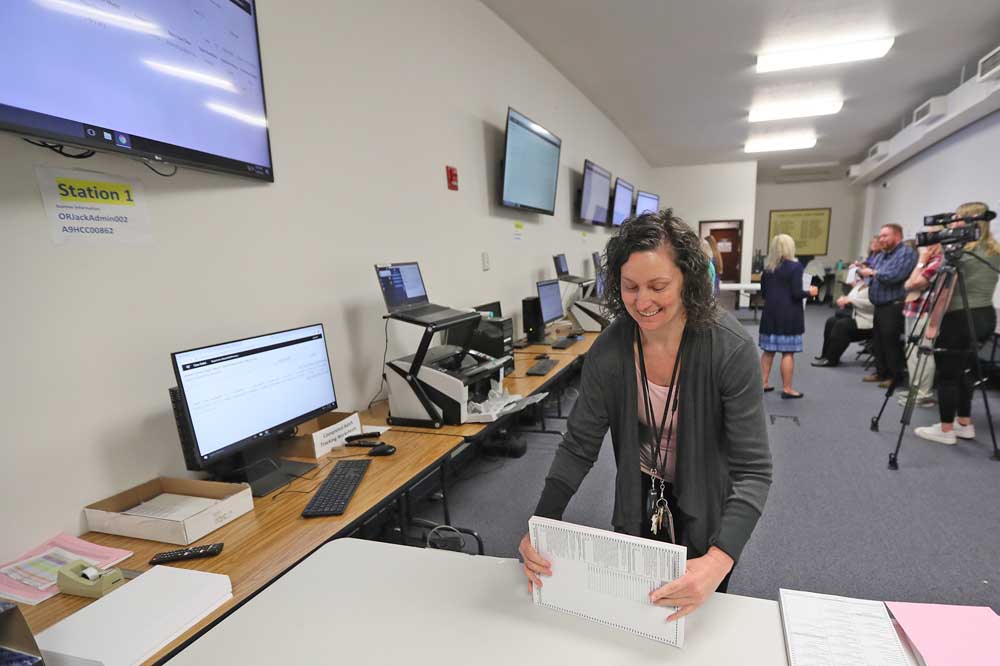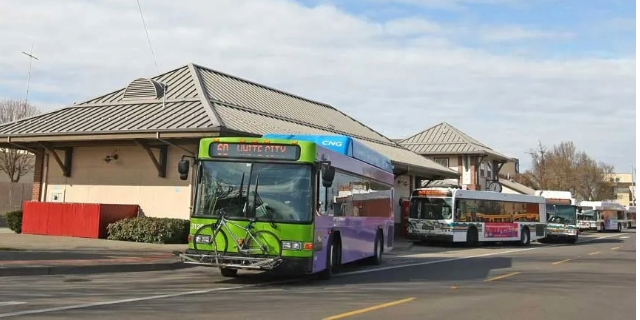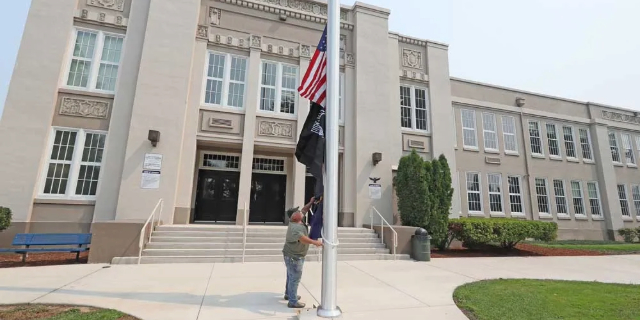One week before Jackson County primary, voter turnout ‘very, very slow’
Published 5:15 pm Tuesday, May 14, 2024

- Trisha Myers, elections program manager, helps to perform an election system test at the Jackson County Clerk's Office in Medford on Tuesday.
The Jackson County Elections Office has received and processed 7.7% of ballots as of May 14 — one week before the primary election.
The 12,495 primary ballots boil down to 10.7% of registered Democrat voters, 10.8% of registered Republican voters, 3% of non-affiliated voters and 7.3% of all other political parties, according to numbers provided by Jackson County Clerk Chris Walker on Tuesday morning. Based on the way ballots are trickling in, Walker is expecting a turnout rate of around 40%.
“Really, at this point, it’s just very, very slow,” Walker said.
A month ago, she was predicting a turnout rate closer to 50%, considering this year’s election included highly publicized ballot measures open to nonaffiliated voters.
“We’re just here waiting for the ballots,” Walker said.
Walker did not mention them by name, but measures 15-224, 15-225 and 15-226 — all backed by the group Jackson County for All — seek to make Jackson County commissioner a nonpartisan position, expand the county’s Board of Commissioners from three to five seats and limit commissioner pay to $75,000 per year.
Walker disputed concerns she’s heard about the U.S. Postal Service’s handling of mail-in ballots since the agency restructured earlier this year and consolidated more mail processing in Portland, and said her office has been receiving mailed ballots. She said ballots submitted to authorized drop boxes handled by the elections office are also slow.
She is unsure how the Postal Service changes will impact things after polls close, however.
“We just don’t know what to expect because of the recent changes,” Walker said.
Walker pointed to the virtually empty lobby at the elections office following the public certification test of the county’s ballot scanners on Tuesday morning as another sign.
She wondered aloud if the slow turnout is related to the presumptive Republican and Democrat nominees, who voters likely already know and have already decided on. She described it as one of the most unusual primary elections in both her 16-year tenure as county clerk and her combined 29 years working at the clerk’s office.
“This has been the weirdest presidential primary I’ve ever seen,” Walker said.
She said she hopes more voters participate in the election because “there’s so many things affecting locals’ bottom line.”
“I would encourage voters — they need to get out and vote,” Walker said.
Jackson County Elections’ certification test is required under state law to demonstrate the county’s scanners can accurately pick up all bubbled entries. The county’s audit staff and one observer, Robin Lee with the Jackson County Republican Party, were present.
The test also verifies the machines can detect when a voter selects no candidate — known as an “undervote” — and that it can detect and flag “overvote” ballots, when a voter fills in multiple candidates.
Election staff does not determine how to interpret the voter’s intent on overvote ballots. Instead, adjudicating the ballot falls on volunteer groups composed of one Republican and one Democrat, who together look at the voter instructions and decide together.
During the roughly two-hour certification process, Walker mentioned that she was recently named secretary of the U.S. Election Assistance Commission board of advisors and spoke in detail about election security.
She talked about how the vote tabulation system is kept in a locked, secure location monitored by motion-activated cameras. Walker said the tabulating machines are networked together, but are not connected to the internet or on any other county network.
Data from the tabulating machines gets uploaded to county computers via encrypted thumb drives. Staff verify the numbers using printout reports, then upload the data to the Oregon secretary of state’s office using the Election Night System, or ENS.
Walker highlighted a host of recent security upgrades at the elections office, such as an entirely locked front counter with protective windows in the lobby and, throughout the building, motion-activated cameras and panic buttons.
“Is it a failsafe? No, but at least we have time,” Walker said.
She said that Jackson County Community Justice’s being on the floor below adds to the elections office’s security, and she referred to staff, including parole and probation officers downstairs, as “election ambassadors.”
Also adding to security is a backup generator that was installed when the building was used as an Emergency Communications of Southern Oregon 911 dispatch center. The generator was tested just last week, Walker said.
Roughly half the state’s election administrators have retired since the 2020 election, Walker said. National politics came home when the Jackson County Elections parking lot was vandalized with the phrase “Vote don’t work, Next time Bullets” the week the November 2020 election results were certified.
She said the threat affected her, but that she stays in the job because a free and fair election is something greater than any one person and any one party.
“It’s bigger than us,” Walker said. “What you’re doing makes America America.”
Official ballot drop-off locations are outside the elections office at 1101 W. Main St. in Medford, the Medford library at 205 S. Central Ave., the Ashland library at 410 Siskiyou Blvd., the Central Point library at 116 S. Third St., the Phoenix library at 510 W. First St., the Eagle Point library at 239 W. Main St. and the Rogue River library at 412 E. Main St.
Ballots must either be received at a ballot box by 8 p.m. Tuesday, May 21, or must be postmarked no later than that date. The elections office has until May 28 to receive any valid postmarked ballots, voters have until June 11 to resolve challenged ballots and the election results must be certified by June 17.







